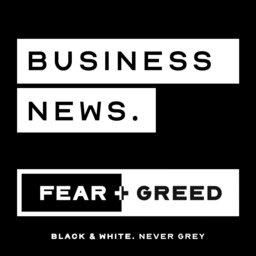Welcome to Ask Fear and Greed, where we answer questions about business, investing, economics, politics and more. I'm Michael Thompson and hello Sean al Michael. This one falls into the economics category, doesn't it?
Sort of?
It actually does, But it's not really a number as such, is it. It's it's more of a trend. You know. Maybe I'll just ask the question and let you answer, Sean. What is the lipstick index?
Is the great index? So the idea is that when facing an economic crisis, consumers are more willing to buy less costly luxury goods. So this is not just the rich, it's the rich and the poor, or the rich and the middle class, shall we say so? The rich instead of buying expensive purses and fur coats, they just buy expensive cosmetics, like high end brands of lipstick. The middle class they want to treat themselves, but they're not going out for dinner, They're not doing that sort of thing, so they go and buy lipstick. What's cool about this? Lennae Leaed Louder as in Stay Louder, the Louder Family. After the September eleven attacks in two thousand and one, the economy went into recession, he just was really surprised by how lipstick sales went through the roof. So a few years later he just went through the company's sales of lipstick and said, this is really weird that in a downturn in economic recession, lipstick sales have gone through the roof. And so this is how this hypothesis came up. The idea is that lipstick's an affordable luxury, like a small treat. You're not breaking the bank. You can just you know, you feel better about yourself. It's an indulgence even in the tough times.
It's like a self care thing.
Yeah when.
And pretty much any socioeconomic group is able to still afford a type of it, yes, right, and so it is resilient, it.
Is, and like there's more to it than just after the September eleven attacks. So there's a lot of literature that after World War II, places like Chanelle di or Eve Saint Laurent, they sort of pushed towards luxury, cheap luxury products. I mean, lipstick's a great example of it. Because there was sort of empowerment of women in the fifties and particularly the sixties who wanted affordable luxuries and they couldn't really buy designer bag or suit. They could buy perfume or cosmetics.
So when we talk though about the lipstick index, what does it actually tell us is there when lipstick sales go up, is that kind of does that correlate with a downturn in the economy or is it just the fact that there is just this trend. Notice that lipstick sales, for instance, as an example of that kind of tier of cosmetic products, are fairly resilient regardless.
So the problem with the lipstick index, and this is the heart of what you've did asked, is that there's no empirical evidence that it works. Okay, so in economics, I remember in first year economics, there's something called a Giffen good and a giff and good GI double fen. The more expensive it is, the more people buy, So it works totally the opposite to demand supply. And this is sort of a little bit in that area whereby when people can't afford stuff, they tend to buy lipstick. Like lipstick isn't it doesn't really fit the definition of a gift and good, but it's somewhere in that area. Now, there has been recessions since two thousand and one. There has been a sort of empirical analysis of this and it just doesn't quite hold, which really really is quite disappointing because I love the idea of the lipstick index.
I love the fact that you kept that for the end. We got right to the very end, and then you said, you know what.
It doesn't really work. So Domino's Pizza. Domino's Pizza have its share price and sales therefore its share price have sometimes done really really well in downturns. So after COVID for example, or was during COVID, actually Dominoes did incredibly well because people they don't can't afford to go out for dinner, but they can't afford to buy Domino's pizzas, and so it's kind of a bit the same, the Domino's Pizza effect. I don't think that's going to hold. But the problem with all these theories there's not a lot of empirical evidence, but they're great stories.
Okay, you know, we might have to do a subsequent it's a hard word for me to say today on a follow up episode on a couple of other indexes, like the mac index and things which I find though they are fascinating, and those ones are there is a bit more behind those ones in terms of the numbers and the comparisons and what you can tell from that. But we shall park the big mac index for now, and we shall wind the lipstick index back into its container, lipstick tube. I don't know, I don't know, no anyway, not particularly familiar with it. And you know what I think we have done here.
We have successfully put to put better any idea that the lipstick index works.
Yep, also put lipstick on a pig. And we've done our best. Thank you, sure, thank you.
Michael.
Oh got it fell apart there at the end, isn't it. If you've got your own question that you would like to ask us, you can pop it onto an email via the website Fear and Greed dot com dot au, or head along to any of the social media platforms Instagram LinkedIn Facebook, send you a question on through and we will answer it asap. I'm Michael Thompson and that was asked Fear and Great
 FEAR & GREED | Business News
FEAR & GREED | Business News



